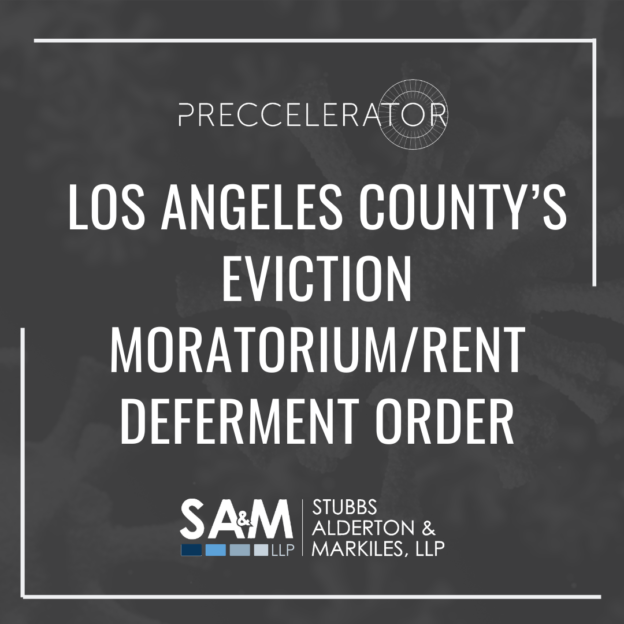
Los Angeles County’s Eviction Moratorium/Rent Deferment Order
On April 14, the Los Angeles County Board of Supervisors amended its March 19 order that mandated an eviction moratorium on both residential and commercial tenants and gave defaulting tenants the ability to defer rental payments that become due through May 31, 2020 for months.
(March 19: https://covid19.lacounty.gov/wp-content/uploads/19032020HP_MFP_M577143825.pdf; April 14: http://file.lacounty.gov/SDSInter/bos/supdocs/145198.pdf#search=%22moratorium%20eviction%22.)
Specifically, the April 14 amendment expands coverage of the March 19 order to all cities in Los Angeles County that have not enacted their own eviction moratorium/rent deferment order and mobile home parks who rent space to mobile homeowners, in addition to the unincorporated areas of Los Angeles County that the March 19 order initially covered. Thus, cities within Los Angeles County who have enacted their own order, like the City of Los Angeles, do not fall under the Los Angeles County order.
Critically, while Los Angeles County’s order initially required defaulting commercial and residential tenants to demonstrate an inability to pay rent and/or related charges due to “financial impacts” related to COVID-19 in order to not be evicted for nonpayment of rent, the April 14 amendment provides that both commercial and residential tenants may “self-certify” their inability to pay as a result of “financial impacts,” and requires landlords to accept such self-certification. Tenants must still provide notice to their landlords of their inability to pay within 7 days of the due date.
“Financial impacts” include “substantial loss of household income due to business closure, loss of compensable hours of work or wages, layoffs, or extraordinary out-of-pocket medical expenses” that are “related to COVID-19” (i.e. if it is a result of any of the following: (1) diagnosed with COVID-19, or caring for a household or family member who is diagnosed with COVID-19; (2) layoff, loss of hours, or other income reduction resulting from business closure or other economic or employer impacts of COVID-19; (3) compliance with a recommendation from the County’s Health Officer to stay home, self-quarantine, or avoid congregating with others during the state of emergency; (4) extraordinary out-of-pocket medical expenses related to diagnosis and testing for and/or treatment of COVID-19; or (5) child care needs arising from school closures related to COVID-19).
Los Angeles County’s order as amended also prohibits both residential and commercial evictions based on the presence of unauthorized occupants, pets, or nuisance necessitated by or related to COVID-19. Further, the April 14 amendment extends a defaulting tenant’s time to pay back the deferred rental payments from 6 months after the expiration of the moratorium period (which is currently set for May 31, 2020 but may be extended) to 12 months.
It is worth reiterating that if a city within Los Angeles County has enacted its own order, then that order would apply over Los Angeles County’s. It is thus crucial for landlords and tenants alike to familiarize themselves with the order that is applicable to their location, as the vast majority of cities both inside and outside of Los Angeles County, as well as other counties themselves, do not allow for similar “self-certification,” and instead require a defaulting tenant to “demonstrate” or “show” an inability to pay rent due to COVID-19. When such demonstration or showing is required, tenants should be prepared to provide some form of supporting documentation, which might include bank statements, financial statements, accounts payable/receivable, or any other reasonable documentation. Given a lack of guidance on what constitutes sufficient supporting documentation, tenants should immediately begin the process of negotiating with their landlords to determine the supporting documentation that will be provided.
In sum, municipal eviction moratorium/rent deferment orders may differ from Los Angeles County’s order by: (a) excluding commercial tenants, or certain commercial tenants, from protection; (b) providing alternative timeframes for notifying landlords of an inability to pay or for making deferred rent payments once the applicable order or the COVID-19 emergency period expires; and (c) requiring a demonstration or showing of an inability to pay because of COVID-19.
For instance, while the City of Los Angeles’ eviction moratorium/rent deferment order also covers both residential and commercial tenants, it: (a) does not extend protections to commercial tenants that are publicly traded companies, transnational companies, or companies with over 500 employees; (b) only grants defaulting commercial tenants a 3 month window after the emergency period to make up deferred payments (defaulting residential tenants have a 12 month window); and (c) was revised to not require defaulting tenants to “show” an inability to pay rent for reasons related to COVID-19; however, it also does not provide for self-certification – whether and to what degree tenants will need to substantiate an inability to pay because of COVID-19 under this order is thus unclear at this time. (LA City’s Order: http://clkrep.lacity.org/onlinedocs/2020/20-0147-S19_ORD_186585_03-31-2020.pdf.)
In light of the foregoing, all tenants (and to the extent applicable, landlords) should immediately:
- Familiarize themselves with their applicable order, specifically the notice requirement and deferment periods;
- If the applicable order so requires, be prepared to provide documentation demonstrating an inability to pay because of COVID-19; and
- Understand that you will need to pay any deferred rent eventually, so start the conversation with your landlord as soon as possible to work out an agreement.
Preccelerator COVID-19 Resource Center
https://preccelerator.com/category/covid-19-resources/
SA&M authors:
For more information on these matters, please contact our COVID-19 Task Force at info@stubbsalderton.com or one of our attorneys at SA&M.



